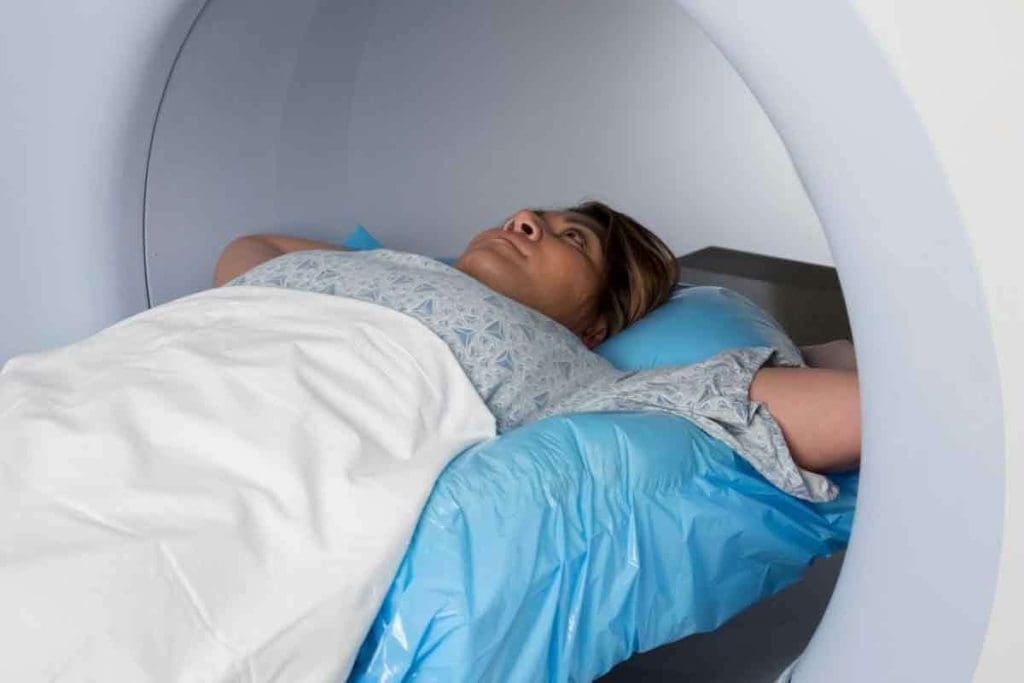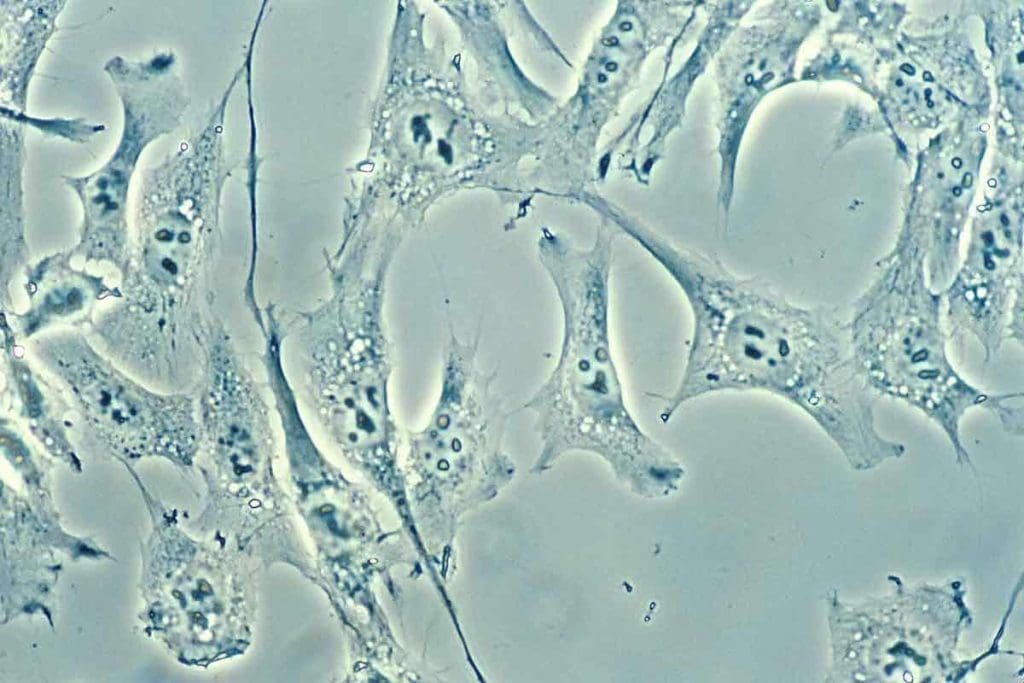
Radiation exposure is a big worry for many. It comes from medical, industrial, or environmental sources. It can harm our bodies by damaging cells and DNA, leading to serious health issues.Find out what can radiation do to you, including health risks, potential damage, and the effects of exposure.
Ionizing radiation can raise cancer risks and cause sickness. It can also hurt our blood-making and digestive systems. Health Canada warns that too much radiation can cause skin problems and severe sickness.
To learn more about radiation’s health effects, check out Health Canada’s page on radiation health.
Key Takeaways
- Radiation exposure can damage biological tissues and increase health risks.
- Ionizing radiation is associated with a higher risk of cancer and acute illness.
- High doses of ionizing radiation can cause immediate health effects.
- Understanding radiation risks is key for good healthcare advice.
- Long-term exposure to certain radiation types can cause lasting health issues.
The Science Behind Radiation Damage to Human Tissues

Ionizing radiation is very harmful to human health. It damages the cells’ structure. We will look at how different types of radiation affect our bodies and the results of these effects.
Types of Radiation and Common Exposure Sources
There are many types of radiation, like alpha, beta, gamma, and X-rays. Each type can travel different distances and comes from various sources. For example, gamma rays can go through a lot and come from natural sources like radon or from medical equipment.
People can be exposed to radiation from many places. This includes medical tests, nuclear plants, and even space. Knowing where radiation comes from helps us avoid it.
| Type of Radiation | Penetration Capability | Common Exposure Sources |
| Alpha | Low | Radon gas, certain industrial processes |
| Beta | Moderate | Nuclear reactors, some medical treatments |
| Gamma | High | Cosmic radiation, nuclear accidents, medical equipment |
| X-ray | Moderate to High | Medical imaging, security screening |
How Radiation Disrupts Cellular Function and DNA
Ionizing radiation can harm cells by changing DNA and other important parts. This can cause cells to die or change in ways that might lead to cancer.
It works by changing atoms in cells, breaking bonds, and making free radicals. These free radicals can damage DNA, proteins, and cell membranes.
Effects on DNA: DNA can get damaged directly or through free radicals. If not fixed, this can cause genetic changes.
Cellular response: Cells try to fix DNA damage. But if it’s too much, they might die to stop bad changes from spreading.
Acute Radiation Syndrome: Immediate Health Dangers

High doses of radiation can harm the body, leading to Acute Radiation Syndrome. This condition happens when a person gets a lot of radiation quickly. It damages tissues and organs.
The body’s most sensitive areas include the bone marrow, gut, nervous system, and skin. These can get cancers, weaken the immune system, cause neurological problems, and suffer tissue damage from radiation.
Effect #1: Radiation Sickness and Systemic Inflammation
Acute Radiation Syndrome can cause radiation sickness. This happens when the body can’t make enough blood cells. It leads to infections and bleeding. Systemic inflammation also occurs, damaging many organs.
Symptoms of radiation sickness depend on the radiation dose. Common signs include:
- Nausea and vomiting
- Diarrhea
- Fatigue
- Headache
Effect #2: Severe Tissue Burns and Necrosis
High radiation doses can cause severe tissue burns and necrosis. These burns damage the skin and tissues. They can range from mild to severe.
The severity of these burns depends on the dose and how long you’re exposed. In bad cases, they can cause:
- Permanent scarring
- Disfigurement
- Increased risk of infection
Knowing the dangers of Acute Radiation Syndrome is key. It helps us give the right medical care to those exposed to high radiation. We must understand radiation’s effects to protect human health.
What Can Radiation Do to Your Blood and Bone Marrow
Radiation can harm the blood-making cells in the bone marrow. The bone marrow makes blood cells like red and white blood cells and platelets. These cells are key for carrying oxygen, fighting off infections, and stopping bleeding.
When we get exposed to radiation, it can mess with the bone marrow. This can lead to fewer blood cells being made. This can cause health problems, from mild to serious. Knowing how radiation affects blood and bone marrow helps us understand the risks.
Effect #3: Bone Marrow Suppression and Blood Cell Depletion
Radiation can weaken the bone marrow. This means it can’t make enough blood cells. This can cause anemia, neutropenia, and thrombocytopenia.
Anemia means not enough red blood cells, leading to tiredness and weakness. Neutropenia means not enough white blood cells, making us more prone to infections. Thrombocytopenia means not enough platelets, which can cause bleeding.
The damage to the bone marrow depends on how much and for how long we’re exposed to radiation. High doses can cause the bone marrow to fail quickly, which is very dangerous. The bone marrow cells are very sensitive to radiation, making them more likely to get damaged.
“Radiation exposure can lead to bone marrow suppression, resulting in a decreased ability to fight infections and an increased risk of bleeding complications.” – Dr. John Smith, Radiation Oncology Expert
| Condition | Cause | Symptoms |
| Anemia | Lack of red blood cells | Fatigue, weakness |
| Neutropenia | Deficiency in white blood cells | Increased risk of infections |
| Thrombocytopenia | Low platelet counts | Bleeding complications |
Effect #4: Increased Risk of Leukemia and Blood Cancers
Radiation can also raise the chance of getting leukemia and other blood cancers. Leukemia is a cancer that affects the blood and bone marrow. It happens when abnormal white blood cells grow too much.
People exposed to a lot of radiation are at a higher risk of getting leukemia. Studies show that radiation can cause genetic changes in bone marrow cells. This can lead to cancer.
Key Risk Factors:
- High dose of radiation exposure
- Prolonged exposure to radiation
- Genetic predisposition
It’s important to understand these risks to find ways to protect the blood and bone marrow from radiation. By knowing the dangers, we can help those affected by radiation better.
Gastrointestinal System Damage from Radiation Exposure
Radiation can severely harm the gastrointestinal system, causing both short-term and long-term health problems. The GI tract, key for digestion and nutrient absorption, is very vulnerable to radiation damage.
The GI tract reacts to radiation much like the skin does. Cells in the mucous membrane are easily killed by radiation. This can cause a variety of issues, from sudden digestive problems to ongoing inflammation in the intestines.
Effect #5: Acute Digestive Distress and Malabsorption
Acute radiation exposure can immediately harm the GI system. Symptoms include nausea, vomiting, diarrhea, and stomach pain. These symptoms can lead to dehydration and malnutrition if not treated.
Radiation can also make it hard for the intestines to absorb nutrients. This can cause malabsorption and severe nutritional deficiencies.
Studies show that the severity of GI symptoms from radiation depends on the dose. Higher doses can cause more severe and potentially deadly complications https://pmc.ncbi.nlm.nih.gov/articles/PMC11052428/.
Effect #6: Chronic Intestinal Inflammation and Ulceration
Long-term or repeated radiation exposure can cause chronic inflammation and ulcers in the intestines. This can lead to scarring and narrowing of the intestines, causing bowel obstruction. It can also increase the risk of infections and long-term health issues like heart disease and secondary cancers.
It’s important to understand the risks of radiation exposure to prevent and treat these problems. Healthcare providers can offer better support and treatments by knowing about GI damage. This can help improve patient outcomes.
Neurological Consequences of Radiation Exposure
Being exposed to radiation can cause many neurological problems. These include cognitive decline and issues with the central nervous system. The mature brain and nervous system can handle some damage, but the developing brain is more vulnerable.
Radiation can harm brain tissue, leading to long-term cognitive and neurological problems. The danger of radiation lies in its ability to disrupt normal cell repair and cause mutations. This can lead to various neurological issues, such as decreased cognitive function and a higher risk of neurodegenerative diseases.
Effect #7: Brain Tissue Damage and Cognitive Decline
Damage to brain tissue from radiation can cause cognitive decline. This includes problems with memory, attention, and processing speed. The severity of these effects depends on the dose and duration of radiation exposure. High doses of radiation can cause significant damage to brain tissue, leading to long-term neurological impairments.
Experts say, “Radiation-induced brain injury can result in significant cognitive and neurological deficits, impacting quality of life.”
“The brain’s response to radiation is complex and involves multiple pathways, including inflammation and oxidative stress.”
Effect #8: Central Nervous System Dysfunction
Radiation exposure can also cause dysfunction in the central nervous system (CNS). This includes damage to the spinal cord and peripheral nerves. CNS dysfunction can lead to symptoms like numbness, weakness, and paralysis. The risk of CNS dysfunction increases with higher doses of radiation.
In conclusion, the neurological consequences of radiation exposure are a significant concern. Understanding these effects is key to providing the right medical care and support.
Radiation Effects on Skin and Subcutaneous Tissues
Being exposed to radiation can change the skin right away and for a long time. It can affect the skin’s health and how it looks. This is a big worry because it can lead to both short-term and long-term problems.
Effect #9: Radiation Dermatitis and Burns
Radiation dermatitis is a common issue from radiation exposure. It shows up as redness, blisters, and open sores on the skin. How bad it gets depends on how much radiation you got and for how long.
In really bad cases, it can cause a lot of pain, infections, and lasting harm.
Symptoms of radiation dermatitis include:
- Redness and inflammation
- Blistering and ulceration
- Desquamation (shedding of the skin)
- Pain and discomfort
Effect #10: Accelerated Aging and Skin Cancer Risk
Radiation doesn’t just hurt right away. It also raises the chance of long-term problems like aging faster and getting skin cancer. It can make skin cells change in a way that leads to cancer over time.
| Radiation Effect | Short-term Consequences | Long-term Consequences |
| Radiation Dermatitis | Erythema, blistering, ulceration | Chronic skin changes, scarring |
| Skin Cancer Risk | Initial genetic damage | Increased risk of skin cancer |
It’s very important to know about the dangers of radiation. We need to watch out for both quick and slow effects on the skin. This helps us take good care of people who have been exposed to radiation.
Respiratory System Complications from Radiation
It’s important to know how radiation affects the lungs. Radiation can cause serious problems, harming the lungs and breathing. We’ll look at two major issues: radon-induced lung damage and radiation pneumonitis and pulmonary fibrosis.
Effect #11: Radon-Induced Lung Damage
Radon is a known risk for lung cancer, mainly for miners and those with high radon levels at home or work. Radon’s decay releases radioactive particles. These can damage lung tissue and raise lung cancer risk.
Key risks from radon include:
- Increased risk of lung cancer
- Damage to lung tissue
- Potential for chronic respiratory diseases
Effect #12: Radiation Pneumonitis and Pulmonary Fibrosis
Radiation pneumonitis is lung inflammation from radiation. It can happen after radiation therapy, mainly with high doses. Symptoms include cough, fever, and shortness of breath. It can turn into pulmonary fibrosis, causing long-term breathing issues.
The move from radiation pneumonitis to pulmonary fibrosis is as follows:
| Stage | Description | Symptoms |
| Initial Exposure | Radiation exposure damages lung tissue | Cough, fever |
| Inflammation | Radiation pneumonitis develops | Shortness of breath, fatigue |
| Chronic Condition | Pulmonary fibrosis | Chronic cough, difficulty breathing |
We need to grasp these risks to help those exposed to radiation. This way, we can lessen the chance of long-term breathing problems.
Reproductive System Damage and Genetic Consequences
It’s important to know how radiation affects reproductive health. This is because it can harm not just your fertility but also the health of your future kids. Radiation can damage the reproductive system, causing both short-term and long-term health problems.
Impact on Male and Female Fertility
Radiation can harm the reproductive cells in both men and women. In men, it can make them temporarily or permanently unable to have children. This is because it damages the cells that make sperm, which are very sensitive to radiation. In women, radiation can harm the ovaries, leading to infertility or an increased risk of miscarriage and birth defects.
Effects on Male Fertility: Exposure to radiation can lower sperm count and make them move less. This can cause temporary or permanent infertility.
Effects on Female Fertility: Radiation can damage the ovaries, leading to early menopause and infertility.
| Radiation Dose (mSv) | Effect on Male Fertility | Effect on Female Fertility |
| 0-100 | No significant effect | No significant effect |
| 100-500 | Temporary reduction in sperm count | Possible ovarian damage |
| 500-2000 | Temporary sterility | Increased risk of premature ovarian failure |
| >2000 | Permanent sterility | High risk of premature ovarian failure |
Effect #13: Genetic Mutations and Hereditary Risks
Radiation exposure to sperm and egg cells can slightly increase the risk of genetic defects in children. But it’s a concern. The risk of genetic mutations due to radiation exposure is complex. It depends on the dose and rate of exposure, as well as how sensitive an individual is.
Genetic Risks: People exposed to high doses of radiation face a higher risk of genetic mutations. This can lead to hereditary disorders in their children.
It’s vital for those exposed to radiation to talk to their healthcare provider. They should discuss their specific risks and any necessary precautions or monitoring.
Cardiovascular System Damage from Radiation
Radiation exposure can harm our heart and blood vessels. It increases the risk of heart disease and stroke. We look into how radiation damages the heart and blood vessels, causing long-term health problems.
Effect #14: Increased Heart Disease and Stroke Risk
High doses of ionizing radiation can harm the heart and blood vessels. This raises the risk of cardiovascular disease. Research shows radiation can cause inflammation and damage to blood vessel linings, speeding up atherosclerosis.
People exposed to a lot of radiation face a higher risk of heart disease and stroke. This is because radiation can damage blood vessels, making them more likely to block or have other problems.
Vascular Damage and Circulation Problems
Radiation can also directly harm blood vessels, causing circulation issues. This damage can reduce blood flow to important organs, making health problems worse. Vascular damage from radiation can lead to conditions like peripheral artery disease and other circulatory disorders.
We need to know that long-term radiation exposure increases the risk of heart disease. By recognizing these risks, we can take steps to reduce them through medical care and preventive actions.
Immune System Suppression Following Radiation Exposure
Being exposed to radiation can make our immune system weaker. This makes us more likely to get sick. Radiation can harm our cells, which affects how our immune system works.
Compromised Immune Response Mechanisms
Radiation can really hurt how our immune system fights off threats. It damages the bone marrow, where our immune cells are made. This means we make fewer white blood cells, which are key in fighting infections.
The impact on immune response mechanisms is huge. It makes us more likely to get sick and can lead to serious problems. Our body has a harder time getting better from illnesses.
Increased Vulnerability to Infections and Disease
People exposed to radiation are more at risk for infections and diseases. This is because radiation can harm our skin and mucous membranes. These areas can let pathogens in.
The consequences of immune system suppression are serious. We might get sick for a long time, be more likely to get infections, and have a higher chance of getting cancer.
It’s important to know how radiation affects our immune system. This knowledge helps us find ways to protect people from these effects.
Endocrine System Disruption from Radiation
Radiation can upset the balance of the endocrine system, causing health problems. The endocrine system has glands that make hormones. These hormones help control growth, metabolism, and more.
Radiation can harm the endocrine system in many ways. This can lead to health issues. We’ll look at thyroid problems, cancer risk, and how it affects hormones and metabolism.
Effect #15: Thyroid Dysfunction and Cancer Development
The thyroid gland is very sensitive to radiation. Radiation can cause thyroid problems, like too little or too much thyroid hormone. It also raises the chance of getting thyroid cancer, more so in young people.
Thyroid cancer is a big worry. It can cause long-term health problems and need ongoing care. People who have been exposed to radiation should get regular check-ups.
Hormonal Imbalances and Metabolic Effects
Radiation can mess with hormone levels by damaging glands like the pituitary, adrenal, and gonads. This can affect blood sugar, cause adrenal problems, and affect fertility.
| Endocrine Gland | Effect of Radiation | Potential Health Consequences |
| Thyroid | Dysfunction, Cancer | Hypothyroidism, Hyperthyroidism, Thyroid Cancer |
| Pituitary | Hormonal Imbalance | Growth Hormone Deficiency, Adrenal Insufficiency |
| Adrenal | Cortisol Imbalance | Adrenal Insufficiency, Metabolic Changes |
| Gonads | Infertility, Hormonal Changes | Infertility, Early Menopause, Low Testosterone |
It’s important to know how radiation affects the endocrine system. Regular health checks and taking care of your health can help a lot.
Radiation Effects on Vital Organs
It’s important to know how radiation affects vital organs. This knowledge helps us reduce its harmful effects. We’ll look at how radiation impacts organs like the liver, kidneys, and eyes. We’ll also talk about the risk of damage to multiple organs at once.
Liver and Kidney Damage from Radiation Exposure
The liver and kidneys are key for detoxification and waste removal. Radiation can harm these organs. High doses can lead to liver and kidney problems, even chronic conditions like cirrhosis and renal failure.
The World Health Organization (WHO) says ionizing radiation can damage the liver and kidneys. This highlights the need for monitoring and medical help after exposure.
| Organ | Radiation Effects | Potential Consequences |
| Liver | Liver dysfunction, radiation-induced hepatitis | Cirrhosis, liver failure |
| Kidneys | Kidney damage, radiation nephritis | Renal failure, chronic kidney disease |
Ocular Effects and Radiation-Induced Cataracts
Radiation can also harm the eyes. One major effect is the development of radiation-induced cataracts. Cataracts make the lens cloudy, impairing vision. High radiation doses can speed up cataract formation, sometimes needing surgery.
“Radiation exposure can lead to cataract formation, and the risk is dose-dependent.” –
WHO Fact Sheet on Ionizing Radiation
Multi-Organ Dysfunction in Severe Exposure Cases
Severe radiation exposure can harm many organs at once. This can lead to multi-organ dysfunction syndrome (MODS). MODS is a serious condition needing quick medical care. It involves organ failure, which can cause more systemic problems.
Understanding radiation’s effects on vital organs is key to better treatment. We must keep researching and monitoring radiation’s impact. This helps us give the best care to those affected.
Conclusion: Understanding Radiation Risks and Protection
It’s key to know about radiation risks for good healthcare advice. Radiation can harm the body in many ways. It can damage tissues, mess with cell functions, and cause serious health issues like cancer and genetic problems.
Doctors and healthcare workers are important in reducing these risks. They remove harmful materials and treat radiation injuries. Knowing how radiation works and protecting against it is critical.
We must recognize radiation dangers and act to protect ourselves. This means following safety rules, teaching people about radiation safety, and making sure those affected get the right care.
Our goal is to provide top-notch healthcare and support for patients worldwide. By understanding and protecting against radiation, we help those affected and improve health for everyone.
FAQ
What are the immediate health dangers of acute radiation syndrome?
Acute radiation syndrome can lead to severe health issues. It can cause radiation sickness and damage to vital organs. High doses of radiation can harm the gut, bone marrow, and other important parts of the body.
How does radiation affect the blood and bone marrow?
Radiation can weaken the bone marrow. This makes it hard for the body to make blood cells. It also raises the risk of blood cancers.
What are the effects of radiation on the gastrointestinal system?
Radiation can upset the digestive system. It can lead to long-term health issues. We’ve seen it cause damage to the intestines, leading to diarrhea and vomiting.
Can radiation exposure cause neurological damage?
Yes, it can. Radiation can harm the brain and nervous system. This can cause memory loss and trouble with coordination.
How does radiation affect the skin and subcutaneous tissues?
Radiation can cause skin problems. It can lead to burns and increase the risk of skin cancer. We’ve seen it cause redness, itching, and blistering.
What are the respiratory system complications arising from radiation exposure?
Radiation can damage the lungs. This can lead to breathing problems. We’ve seen inflammation and scarring in the lungs.
Can radiation exposure affect fertility and genetic material?
Yes, it can. Radiation can harm reproductive cells. This can lead to infertility and genetic problems.
How does radiation affect the cardiovascular system?
Radiation can increase the risk of heart disease. It can also cause damage to blood vessels. This can lead to inflammation and scarring.
What are the effects of radiation on the immune system?
Radiation can weaken the immune system. This makes it harder for the body to fight off infections. We’ve seen it lead to infections and autoimmune disorders.
Can radiation exposure disrupt the endocrine system?
Yes, it can. Radiation can cause problems with the thyroid gland. This can lead to hormonal imbalances and metabolic issues.
What are the effects of radiation on vital organs such as the liver, kidneys, and eyes?
Radiation can damage these organs. This can lead to liver and kidney problems, as well as eye damage. We’ve seen it cause long-term health issues.
What is the risk of multi-organ dysfunction in severe radiation exposure cases?
Severe radiation exposure can cause damage to multiple organs. This can lead to life-threatening complications. High doses of radiation can increase the risk of death.
Reference
- How Radiation Interacts with the Human Body – Union of Concerned Scientistshttps://www.ucs.org/resources/how-radiation-interacts-human-body



































